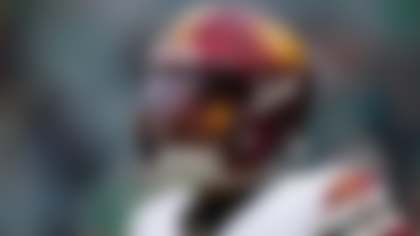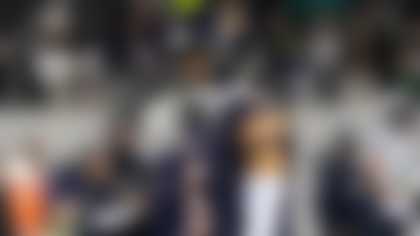INDIANAPOLIS -- Information came at the players like an all-out blitz as manufacturers explained why their product was the best and safest.
Though the topics were wide ranging, preventing head injuries topped the list Friday at the NFL Players Association's second Player Safety and Welfare Summit.
Some 25 players heard presentations from helmet manufacturers and medical personnel that included plenty of charts and videos showing helmets getting blasted like crash test dummies. Sneaker companies, turf producers and nutrition experts were there, too, but protecting the head took center stage.
Carolina Panthers receiver Muhsin Muhammad said most players "have a brief overview" of concussions and their long-term effects, but they're getting a more in-depth lesson from the league and union in the wake of a high-profile study at the University of Michigan that found retired players had a higher-than-normal rate of Alzheimer's disease and memory problems.
"The NFL is taking it seriously and players' safety is an issue that's nonnegotiable," said St. Louis Rams receiver Sean Morey, who has studied the issue and agreed to donate his brain to research after his death. "It's not an issue that we need to debate. It's an issue that we're going to come together collaboratively ... to get the answers right, to understand the long-term cumulative effects and help protect the players."
The NFL last season adopted stricter standards for determining when players can return to games after big collisions. At the combine this week, the league for the first time is giving players tests to establish baseline brain activity and is focusing more on their concussion histories.
Rules changes to limit injuries are under discussion.
The helmet is under the microscope, too.
The league has conducted tests, and this week the manufacturers gave presentations to the league's competition committee about designs that could cut down on the number of head injuries. On Friday, they had an audience with the players.
"Nobody can guarantee that you're not going to get a concussive episode," said Vincent Ferrara, president of helmet manufacturer Xenith.
The technology can improve, however. Players can also make more educated decisions.
The fact that they can even choose their helmet caught some by surprise.
"That's information new to me," said Indianapolis linebacker Freddy Keiaho, who missed a month during his second year because of concussions. "I think that's more information that we as NFLPA need to inform our players. ... To come away with that information made today really worth it."
Many players simply go with the Riddell equipment that teams distribute, unaware they can wear any helmet approved by the National Operating Committee on Standards for Athletic Equipment. Muhammad knew there were choices, but wasn't sure of the extent.
"Typically, you're given A-B-C type of selections," he said. "I wasn't aware of the variety of the selections that were out there."
At the summit, players heard from representatives from Adams USA and Schutt Sports, as well as Riddell and Xenith. Each promoted its cushioning system, some of which contain sensors that make the padding expand like air bags in a car.
They backed up their arguments with studies measuring the force of impact, the number of blows to the head in practices and games. Riddell even tracked where in the head players were most likely to get hit, indicating the company might develop position-specific helmets.
"That could very well happen," vice president Thad Ide said.
The studies mostly centered on college players, which was a sore spot for some in the room. They wondered why the NFL didn't lead the charge.
Union medical adviser Dr. Thom Mayer cited "inertia" by the league, but also praised the NFL for now taking a closer look at the issue.
Mayer, who also serves on the NFL's various health and safety committees, sees a day when helmets will have microsensors that can "fire air bags" in response to the forces involved.
"If the Marine Corps can make a helmet that can stop an AK-47 round and the Marine ends up with a concussion and not a penetrating head injury, then we can come up with a helmet over time that - I don't think will ever be concussion-proof but -- will be more protective of the player than it currently is," he said.
Copyright 2010 by The Associated Press



